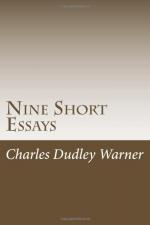The pathetic aspect of the case has not, however, we are sorry to say, struck the American press, which has too often treated with unbecoming levity this unaccountable exhibition of English sensitiveness. There has been little reply to it; at most, generally only an amused report of the war, and now and then a discriminating acceptance of some of the criticism as just, with a friendly recognition of the fact that on the whole the critic had done very well considering the limitation of his knowledge of the subject on which he wrote. What is certainly noticeable is an entire absence of the irritation that used to be caused by similar comments on America thirty years ago. Perhaps the Americans are reserving their fire as their ancestors did at Bunker Hill, conscious, maybe, that in the end they will be driven out of their slight literary entrenchments. Perhaps they were disarmed by the fact that the acrid criticism in the London Quarterly Review was accompanied by a cordial appreciation of the novels that seemed to the reviewer characteristically American. The interest in the tatter’s review of our poor field must be languid, however, for nobody has taken the trouble to remind its author that Brockden Brown—who is cited as a typical American writer, true to local character, scenery, and color—put no more flavor of American life and soil in his books than is to be found in “Frankenstein.”
It does not, I should suppose, lie in the way of The Century, whose general audience on both sides of the Atlantic takes only an amused interest in this singular revival of a traditional literary animosity—an anachronism in these tolerant days when the reading world cares less and less about the origin of literature that pleases it—it does not lie in the way of The Century to do more than report this phenomenal literary effervescence. And yet it cannot escape a certain responsibility as an immediate though innocent occasion of this exhibition of international courtesy, because its last November number contained some papers that seem to have been irritating. In one of them Mr. Howells let fall some chance remarks on the tendency of modern fiction, without adequately developing his theory, which were largely dissented from in this country, and were like the uncorking of six vials in England. The other was an essay on England, dictated by admiration for the achievements of the foremost nation of our time, which, from the awkwardness of the eulogist, was unfortunately the uncorking of the seventh vial—an uncorking which, as we happen to know, so prostrated the writer that he resolved never to attempt to praise England again. His panic was somewhat allayed by the soothing remark in a kindly paper in Blackwood’s Magazine for January, that the writer had discussed his theme “by no means unfairly or disrespectfully.” But with a shudder he recognized what a peril he had escaped. Great Scott!—the reference is to a local American deity who is invoked in war, and not to the Biblical commentator—what would have happened to him if he had spoken of England “disrespectfully”!




